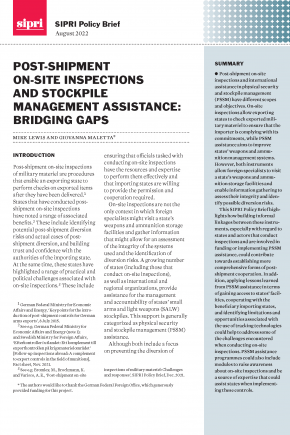Post-shipment On-site Inspections and Stockpile Management Assistance: Bridging Gaps
Post-shipment on-site inspections and international assistance in physical security and stockpile management (PSSM) have different scopes and objectives. On-site inspections allow exporting states to check exported military materiel to ensure that the importer is complying with its commitments, while PSSM assistance aims to improve states’ weapons and ammunition management systems. However, both instruments allow foreign specialists to visit a state’s weapons and ammunition storage facilities and enable information gathering to assess their integrity and identify possible diversion risks.
This SIPRI Policy Brief highlights how building informal linkages between these instruments, especially with regard to states and actors that conduct inspections and are involved in funding or implementing PSSM assistance, could contribute towards establishing more comprehensive forms of post-shipment cooperation. In addition, applying lessons learned from PSSM assistance in terms of gaining access to states’ facilities, cooperating with the beneficiary importing states, and identifying limitations and opportunities associated with the use of tracking technologies could help to address some of the challenges encountered when conducting on-site inspections. PSSM assistance programmes could also include modules to raise awareness about on-site inspections and be a source of expertise that could assist states when implementing these controls.
Introduction
PSSM assistance: A brief overview
PSSM assistance: Lessons learned for on-site inspections
Conclusions and recommendations


